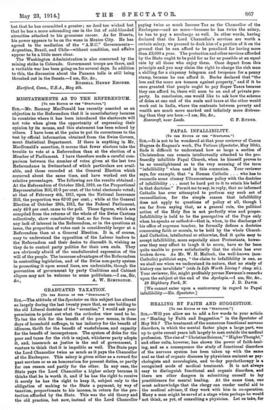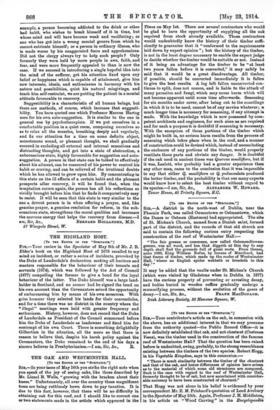HEALING BY FAITH AND SUGGESTION.
[To rue EDITOR 01 THE ..SPEC21,08...] SIR, Will you allow me to add a few words to your article on "Healing by Faith and Suggestion" in the Spectator of May 9th P The treatment of the numerous functional nervous disorders, in which the mental factor plays a large part, was up to quite recent years left largely to men outside the medical profession. The rise of " Christian Science," "Higher Thought," and other cults, however, has shown the power of faith-heal- ing, and as a consequence the study of functional disorders of the nervous system has been taken up with the same zeal as that of organic diseases by physicians eminent as psy- chologists and neurologists, and to-day psychotherapy is a recognized mode of medical treatment. It is not always easy to distinguish functional and organic disorders, and there are other dangers in submitting oneself to lay practitioners for mental healing. At the same time, one must acknowledge that the clergy can render useful aid to the medical adviser, if they work with him in co-operation. Many a man might be saved at a stage when perhaps he would not think, as yet, of consulting a physician. Let us take, for
example, a person becoming addicted to the drink or other bad habit, who wishes to break himself of it in time, but whose mind and will have become weak and vacillating ; or one who has got into a wrong mental groove from which he cannot extricate himself ; or a person in ordinary illness, who is made worse by his exaggerated fears and apprehensions. Did not the clergy always try to help such people? Only formerly they were held by more people in awe, faith, and fear, and were more frequently appealed to than is now the case. If we succeed in introducing a single hopeful idea into the mind of the sufferer, get his attention fixed upon any belief or happiness which is capable of attainment, give him new interests, ideals, and enthusiasms in harmony with his nature and possibilities, quiet his natural misgivings, and teach him self-restraint, we are putting the patient in a mental attitude favourable to recovery.
Suggestibility is a characteristic of all human beings, but there are methods, of course, which increase that suggesti- bility. You have quoted one which Professor Marcus Hartog uses for his own auto-suggestion. It is similar to the one in general use by psychotherapists. If we put ourselves in a comfortable position in a quiet room, composing ourselves so as to relax all the muscles, breathing deeply and regularly, and fix our• attention for a time on some definite object, monotonous sound, or pleasant thought, we shall gradually succeed in excluding all external and internal sensations and distracting thoughts, and get into a state of abstraction, a subconscious state, highly favourable for suggestion and auto- suggestion. A person in that state can be talked to effectively about his ailment, can be reassured of his power to control his habit or• craving, and can be relieved of the irrational doubts which he has allowed to grow upon him. By concentrating in this state on the ill effects of a certain habit and the pleasant prospects after recovery, it will be found that, when the temptation occurs again, the person has all his reflections so vividly brought before him that he finds it comparatively easy to resist. It will be seen that this state is very similar to the one a devout person is in when offering a prayer, and, like genuine prayer, a genuine resolution for reform, in the sub- conscious state, strengthens the moral qualities and increases the nervous energy that helps the recovery from disease.—I















































 Previous page
Previous page